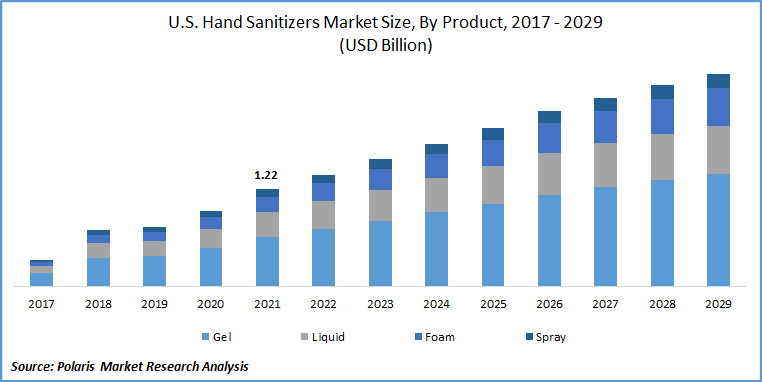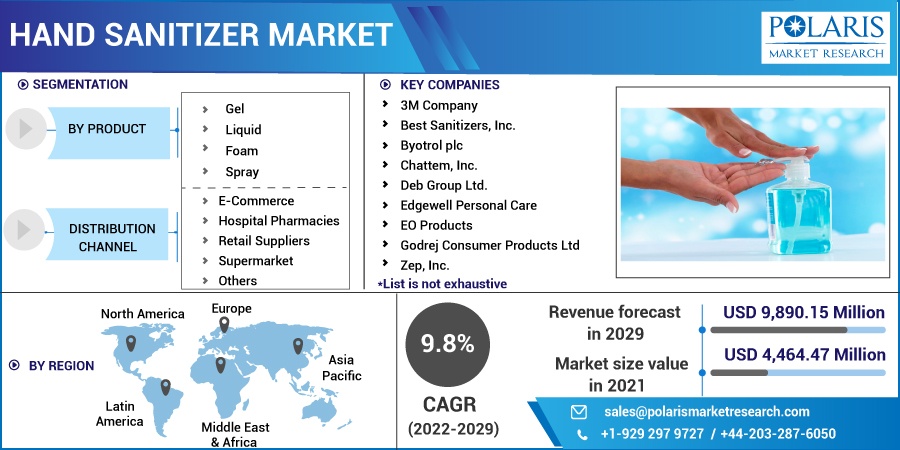
Hand Sanitizer Market Share, Size, Trends, Industry Analysis Report, By Product (Gel, Liquid, Foam, Spray); By Distribution Channel (E-Commerce, Hospital Pharmacies, Retail Suppliers, Supermarket, Others); By Region, Segment Forecast, 2022 - 2029
- Published Date:Jan-2022
- Pages: 101
- Format: PDF
- Report ID: PM1674
- Base Year: 2021
- Historical Data: 2017-2020
Report Summary
The global hand sanitizer market was valued at USD 4,464.47 Million in 2021 and is expected to grow at a CAGR of 9.8% during the forecast period.
The rising hand hygiene concern across the globe is expected to drive the growth of the industry. Hand rub is widely used to kill or slow down the growth of all types of germ present on hands. These can be used anytime, anywhere, at home, in public space, office, car, before a meal or while playing sports, etc.

Know more about this report: request for sample pages
The two types of commonly used disinfectants include alcohol-based sanitizers and alcohol-free sanitizers. Alcohol-based disinfectants are commonly used, which contains different types of alcohol in a varying amount from 20% to 95%, depending on its usage. At the same time, alcohol-free sanitizers contain substances such as octenidine dihydrochloride, chlorohexidine gluconate, and benzalkonium chloride instead of alcohol that are used to lower the harmful effects of microbes.
Alcohol-based sanitizers aid in breaking down the protein coating surrounding the cells of fungi, bacteria, and viruses, including coronaviruses which are considered to be crucial for the survival of the germs and to be able to multiply and attack the human body.
Nowadays, these are available in the form of gel, liquid, foam, and spray. These are easily available in the local stores, which helps to kill and prevent the growth of germs and disinfects the skin. They are effective against bacteria, viruses, and micro-organisms require less time than hand washes, help to improve skin condition; skin-friendly as compared to soap and water.
However, the efficacy of such disinfectants depends on several factors, including the manner in which the product is applied, such as quantity used, frequency of use, and duration of exposure; and whether an infectious agent present on the hands is vulnerable to the active ingredient present in the product.
The emergence of Covid-19 has led to the robust use of hand rub across the globe. Covid-19 is an infectious virus that is transmissible from person to person when they are in close contact. In the wake of the pandemic, the use of sanitizers has become a part of life that aids in killing germs and viruses. Owing to the danger imposed by the disease, the Centre for Disease Control and Prevention (CDC), U.S. recommended and encouraged the use of disinfectants in order to contain the spread of germs.
Covid-19 outbreak has a positive impact on the growth of the hand sanitizer market. The fear of getting exposed to the deadly coronavirus led to the increased production and usage of disinfectants. Since it is easy to use anytime, anywhere and exhibits greater effectiveness, it was recommended and advised by the health officials to carry a disinfectant in order to avoid contracting the coronavirus. Around 27 crore Covid-19 cases have been reported across the globe by the end of fiscal 2021. The rise in cases leads to the rising demand for the industry worldwide.
 Know more about this report: request for sample pages
Know more about this report: request for sample pages
Industry Dynamics
Growth Drivers
The rising health hygiene concern among people is expected to accelerate the growth of the industry. Today, people have become more health-conscious and are adopting a healthy living lifestyle in order to avoid any health issues. Disinfectant prevents the risk of transmission of infections by destroying and slower-down the growth of germs, bacteria, and viruses.
The covid-19 outbreak is one of the major factors driving the growth of the industry. The rising cases across the globe are paving the way for the greater demand for the product. Disinfectants are effective in combating the spread of coronavirus. The new standards regarding the Covid-19 pandemic are accelerating the growth of the market.
Report Segmentation
The market is primarily segmented on the basis of product type, distribution channel, and region.
|
By Product |
By Distribution Channel |
By Region |
|
|
|
Know more about this report: request for sample pages
Insight by Product
On the basis of product, the market is segmented into gel, liquid, foam, and spray. Gel-based sanitizers are expected to dominate the global industry over the forecast period. They are much preferred as it helps destroy bacteria, viruses, and other infection-causing germs instantly without harming the skin. It contains 70%-90% alcohol, glycerin, aloe vera extracts, aloe vera essence, and demineralized water.
Alcohol-based liquid sanitizer is expected to witness significant industry growth in the near future. Gel-based sanitizers are considered more effective as it contains 62%-90% of alcohol that aids in killing the viruses present on hand. Easy availability of liquid-based sanitizer is anticipated to accelerate the growth of the hand sanitizers market.
Insight by Distribution Channel
On the basis of distribution channels, the market is further clustered into e-commerce, hospital pharmacies, retail suppliers, supermarket, and others. The supermarket channel is expected to account for the largest share over the forecast period. The rising concern of personal hand hygiene, along with the easy availability of these disinfectants in supermarkets, is likely to drive the growth of the market. They offer several disinfection products for consumers ranging from personal hand rubs to hard surface disinfectant sprays, along with multiple customer services.
Geographic Overview
North America is expected to dominate the global hand sanitizer market over the forecast period. An increase in Covid-19 cases along with rising personal hand hygiene habits in the region is expected to accelerate the growth of the industry. Covid-19 outbreak drastically knocked the masses of U.S. For instance, buying disinfecting gel has skyrocketed in the U.S. ever since the first case of COVID-19 was reported within the country.
Furthermore, the hand sanitizer market is highly fragmented in the region owing to the wide presence of industry players, including Gojo Industries, Nice Pak, KAS Direct, EO Products, Edgewell Personal Care, and others. These companies offer a wide range of hand rubs to end-users spread across the globe.
Competitive Landscape
Some of the major players operating in the hand sanitizer market include 3M Company, Best Sanitizers, Inc., Byotrol plc, Chattem, Inc., Deb Group Ltd., Edgewell Personal Care, EO Products, Godrej Consumer Products Ltd, Zep, Inc., Gojo Industries, Inc., Henkel AG & Co. KGaA, KAS Direct, LLC, Lion Corporation, Medline Industries, Inc., Nice Pak, Procter & Gamble Co., Reckitt Benckiser Group plc, SC Johnson & Son, Inc., Skinvisible, Inc., The Clorox Company, The Himalaya Drug Company, Unilever plc, and Vi-Jon, Inc
Hand Sanitizer Market Report Scope
|
Report Attributes |
Details |
|
Market size value in 2021 |
USD 4,464.47 Million |
|
Revenue forecast in 2029 |
USD 9,890.15 Million |
|
CAGR |
9.8 % from 2022 - 2029 |
|
Base year |
2021 |
|
Historical data |
2017 - 2020 |
|
Forecast period |
2022 - 2029 |
|
Quantitative units |
Revenue in USD million/billion and CAGR from 2022 to 2029 |
|
Segments covered |
By Product, By Distribution Channel, By Region |
|
Regional scope |
North America, Europe, Asia Pacific, Latin America, Middle East & Africa |
|
Key Companies |
3M Company, Best Sanitizers, Inc., Byotrol plc, Chattem, Inc., Deb Group Ltd., Edgewell Personal Care, EO Products, Godrej Consumer Products Ltd, Zep, Inc., Gojo Industries, Inc., Henkel AG & Co. KGaA, KAS Direct, LLC, Lion Corporation, Medline Industries, Inc., Nice Pak, Procter & Gamble Co., Reckitt Benckiser Group plc, SC Johnson & Son, Inc., Skinvisible, Inc., The Clorox Company, The Himalaya Drug Company, Unilever plc, and Vi-Jon, Inc. |
License and Pricing
Purchase Report Sections
- Regional analysis
- Segmentation analysis
- Industry outlook
- Competitive landscape
Connect with experts
Suggested Report
- Global Automotive Radar Market Research Report, Size & Forecast, 2018 – 2026
- Antimicrobial Coatings Market Share, Size, Trends, Industry Analysis Report, 2021 - 2028
- Leukapheresis Market Share, Size, Trends, Industry Analysis Report, 2021 - 2028
- High Temperature Insulation Market Share, Size, Trends, Industry Analysis Report, 2022 - 2030
- Breathalyzer Market Share, Size, Trends, Industry Analysis Report, 2020-2027

